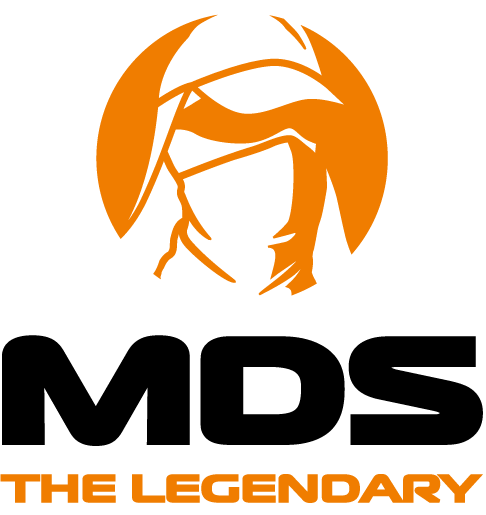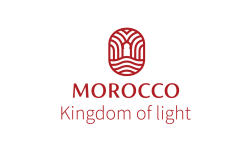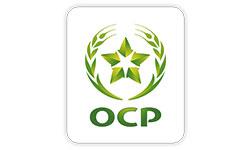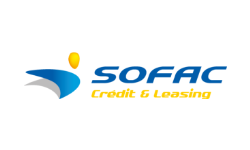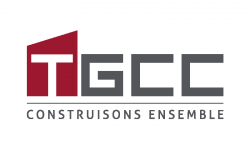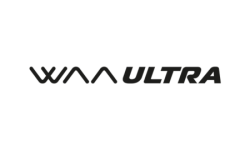du
Ian CORLESS' podcast - TalkUltra - with Cyril GAUTHIER
“If you’re not crazy, don’t do this job”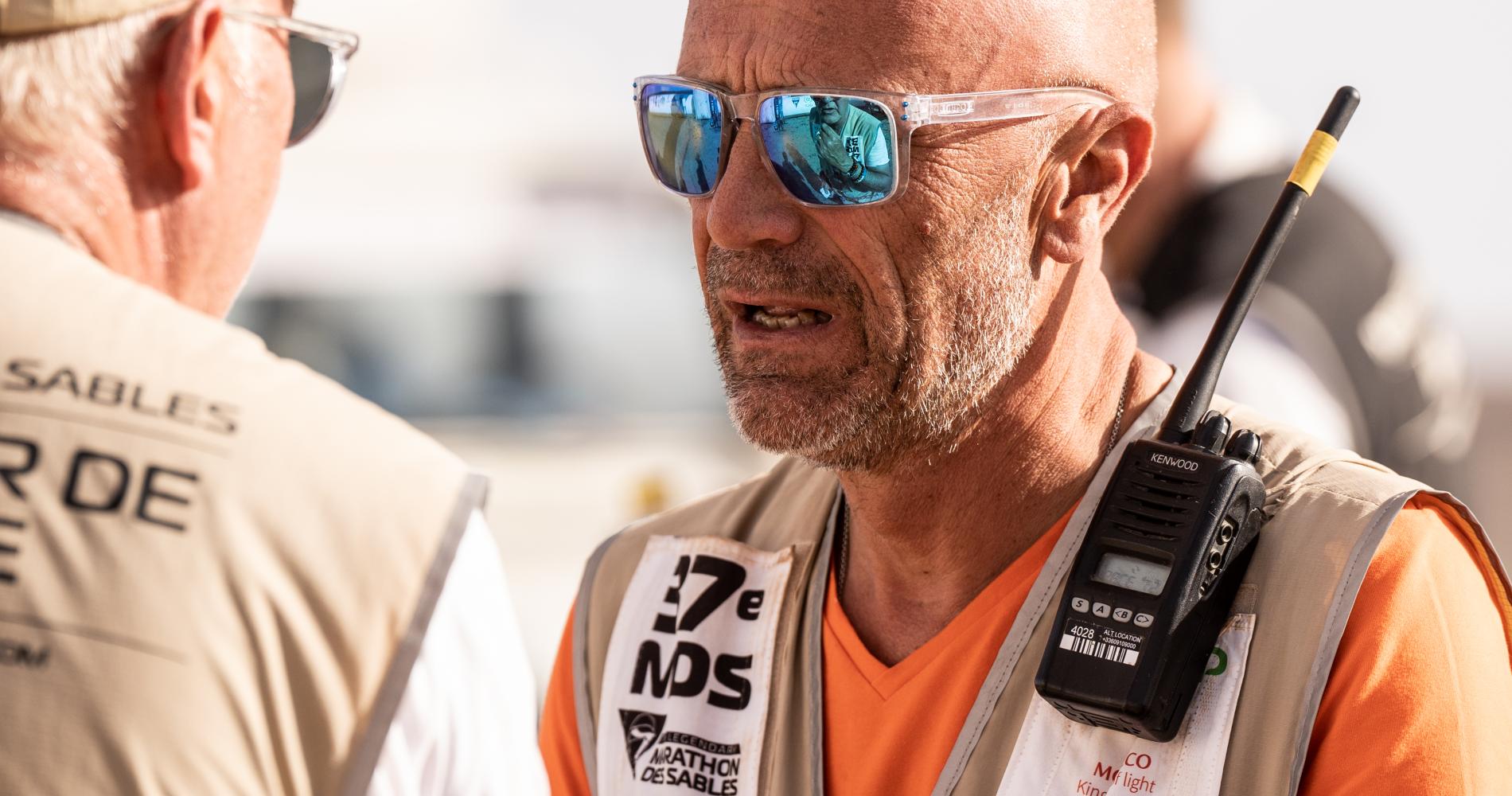
Read the transcription of the podcast produced by Ian CORLESS, British journalist and photographer specializing in ultra-trail, and particularly attached to the MARATHON DES SABLES for more than ten years. His guest, Cyril GAUTHIER, is the new manager of MARATHON DES SABLES.
You can listen to the podcast on the Ian CORLESS TalkUltra website (1h12mn).
Ian CORLESS: Welcome Cyril to this podcast.
Cyril GAUTHIER: Thank you Ian, it’s a great pleasure to speak to such an MDS expert. And I apologize in advance for my poor level of English. The level of English of the French is a problem, and it is also a problem on the MDS: there are not enough volunteers who speak English correctly. This is an issue we will fix in the future.
No worries Cyril, your English is perfectly understandable. Can you tell us a little more about your background, how you became interested in stage races, in the MARATHON DES SABLES?
The story is simple. In 2009, I participated in the MDS like any runner. I was very surprised. For me, it's more than just a race. I have run quite a few ultras, like the UTMB, the Mount Fuji Ultra-Trail. All these races were magical for me, and so in 2009 I did the MDS. And honestly, he changed my life because he was very special to me. From there, I thought about what more I could do for the MDS. I met Patrick and Marie BAUER, the couple behind and at the head of MDS, and I did my job. My job is to manage the logistics of large groups in Europe. And I started doing the same thing for the MDS. It was in 2010, and it was already very good, we set up the first store for the MARATHON DES SABLES brand. We continued talking, and after many meetings, I took a stake in the company. This is where my collaboration with Patrick and Marie really began.
And it was at this time that the WAA brand was born? From now on, the yellow and black WAA backpack is inseparable from the MARATHON DES SABLES.
That's right. In 2012, Marie mentioned the fact that we needed to offer a backpack 100% suitable for the MDS. I told them I knew how to do that, but it would take a little time. We then began to develop the ULTRA BAG. And we were very surprised: it was an immediate and massive success. After that we started to develop objects dedicated to runners and adapted to the desert. Today, this brand still exists and produces equipment perfectly suited to desert events, but also to other running events. And we continue to expand the range and improve the products.
In your first years on the MDS, you were very visible alongside Patrick. What did it mean to be on the other side of the line, to participate in the development of the event, as opposed to being a simple runner?
For four or five years, my job was very simple: to be Patrick's shadow. Trying to understand the race as best as possible, seeing what I could bring, what could be improved. We have communicated over these four or five years with Patrick and Marie, and we have, for example, changed the communication system. Marie, for her part, was happy with these developments, and Patrick a little less, he said to me “Cyril, you always want more. Maybe you should start your own race to experience these developments. » In the collective imagination, the MDS is often associated with an impossible race, reserved for an elite. For my part, I think that the MDS was an extremely difficult race, but that if you are well prepared, if you have the right information beforehand, you can overcome this crazy race. So I proposed to Patrick and Marie a new format, simpler, and on which we could try certain developments of the MDS: the HALF MDS. Peru was the kick-off for these new developments.
But the first edition in Peru was a complete MDS, a copy of the one taking place in Morocco. What process led you to divide the distance by two from now on?
In 2011, there were the Arab Spring, and we asked ourselves the question of creating an MDS elsewhere than in North Africa. Of course, everything is always ok in Morocco, but it was a way to try to secure the event. We then created this MDS in Peru, and if it was excellent for the runners, for the organization it was a nightmare. It was the worst experience of my life, because beforehand, although we had spoken with the authorities and it had gone very well, in practice they did not know how to work on the ground. And it was terrible. But for the runners, as many expressed afterwards, it was a significant experience. After that, we said to ourselves “ok, we know we can do it. We know that it takes a lot of energy to invest. Maybe it would be simpler to just offer a HALF MDS? " And that's what we've done. But we know we can achieve MDS elsewhere in the world.
I must say that I loved this first edition in Peru. The ICA desert is unique, the dunes are fantastic, and the proximity to the ocean adds something very different. So that was the starting point for the HALF MDS, and I must say that it’s a good thing: they allow you to test yourself, to adjust your equipment, your training, to experience desert conditions, before the MDS. But now the HALF MDS have grown and become events in their own right, not just a way to access the MDS. How did you experience this period?
This is very interesting, because HALF MDS are very different from MDS. Of course, you can learn a lot of things about the desert, the environment, the temperatures, the terrain, which will be very useful to you on the MDS. Because when you are on the MDS, if you make the slightest mistake, you can be forced to abandon. And that’s why you’re interested in HALF MDS in the first place. But it’s also very interesting to see different deserts, different terrains, different landscapes. For me, the MDS in Morocco will always be the first and the best because it is a mix of everything, but it was very exciting to prove that you can discover such different deserts and learn such different things. Next year we will have 7 destinations, and we will merge the MDS and HMDS brands. The very first MARATHON DES SABLES, in Morocco, will become the “MDS the Legendary”, and all the other destinations will take the name MDS: MDS Jordania, MDS Egypt, MDS Namibia… The Legendary will be the only one at 240 km, out of the others runners can choose to do 70, 100 or 120 km, in three stages.
It looks like it's a bit closer to the UTMB circuit, with qualifying events to access the main event. Is this what you envision for the MDS?
No not at all. I have known Catherine and Michel POLETTI for years, and we talk a lot about the future of our events. But the MDS is very different from the UTMB. The MDS is not just about running, we talk a lot about the future, about nature, about the planet. We have to offer a crazy race, we have to have fun in the desert, but we have other missions, in the longer term.
Until recently, the finisher rate has been very high. But over the past two, three years, it has declined. But despite this, the MDS remains very accessible if you go there with the right frame of mind. It is an event that has shown the way for all stage races in the world. He is the grandfather, the one who inspired all the others. Patrick BAUER is the emblematic figure associated with this event. Patrick is so passionate, so associated with MDS. With this change, many are asking questions about the future. How can you reassure people that the MARATHON DES SABLES experience will be the same, or even better, in the future?
You are totally right. Patrick and Marie created and managed the race together, even if in 34 editions we have never seen Marie in the spotlight. They always say that behind every great man there is a woman, and in the case of MDS, it couldn’t be more true. But we don't see the team behind Patrick either, and this team will always be there 100%. It's really important to me. Patrick will continue to be in charge of the Solidarité MARATHON DES SABLES association, he will be able to take time to develop it. After 37 editions of the MDS, he is a little tired of the responsibilities. Between 2010 and 2014, he told me that I was there to take care of the future of the event, because he wasn't going to do that for many more years. The most important thing is to understand that we are not going to change the major rules or the teams. People like Joko, Mathieu, have worked for so many years for the MDS, I call them the “invisibles”, and they do a crazy job, and that’s why I’m not going to become the Race Director. We will establish a Steering Committee with seven or eight people. Of course, we will change small things, but while keeping the DNA of the race. For example, we started to question participants about their feelings about the event after the 37th MDS, which had never been done before, except on the British side thanks to Steve, the MDS representative in Great Britain. It’s important for us to get the runners’ feelings. We are getting very interesting feedback, and we are going to adapt certain things on the ground to be sure to satisfy as many people as possible. I come back to the problem of English: I have often said to British runners “if you want to experience a superb MDS, you have to train well, think about your food, but above all you have to learn French! » It’s a shame for us to speak English so badly. This is why we will recruit more volunteers from Great Britain. This is an example but it is very important. The briefing is another example: it often starts 15 minutes late. When Patrick speaks in French, it's ok for everyone, and when the English translation arrives, the French speak among themselves. We are going to change this, perhaps starting with the briefing in English and then French. The changes aren't exceptional, more of an adjustment, but they will make the overall experience better. They are geared towards runners.
The MDS is an international race, the French and the English are the most numerous, but there are so many countries represented each year. This is one of the strong points of the MDS, bringing together all these different people in the middle of the desert. You mentioned Steve who takes care of the British contingent and who every year organizes an MDS exhibition, are you considering this type of thing for the French or in other countries?
Steve is an undeniable leader for the British, he has put some very good things in place for them. It’s interesting for us to take inspiration from it and reproduce what works best in other countries. This is our job, our responsibility. An example: the registration price for such an event is very high. And if you have the slightest problem before the race, a family problem, an injury, you risk losing a large sum of money. Well, from 2024 we are introducing the possibility of deferring your registration for free to the following year. The message is, “Don’t worry about it. » We have already implemented this report on the HALF MDS and the riders have told us how much it reassures them.
This is obviously a very good point in the current climate. Let's talk about the changes from 2024, starting with the Solidarity stage, the sixth stage, which was from 8 to 15 km, which was not really part of the race but raised funds for the MDS association and those of the participants, before the participants get back on the buses and return to civilization. Some really appreciated it, because it allowed them to do a few kilometers with the other people in their tent, but overall the runners didn't really understand this stage: the race ends the day before, everyone received their medal, now everyone Everyone wants to go to the hotel and take a shower. So from now on the race will be done in 5 stages, which seems much more understandable to me. But what about the charity aspect, fundraising?
I really liked this Solidarity stage that we put in place with Patrick and Marie. You know, in France, we don't have this British fundraising culture, for you it's much more natural. So of course this stage allowed the runners to share a moment with their friends, but they can also share it with a beer at their hotel. In reality, highlighting solidarity through this step is not that effective. We need to do something much stronger. This is why the last stage, the fifth, the marathon stage, will become the Solidarity stage. Our mission is to show that we don't do ultra just for our pleasure, but that it can help us change the world. Our planet is suffering, many people are suffering, we know this but we don't do much. I would like the MDS to be a lever allowing us to positively influence the world. I think that by explaining to the runners that together we are capable of doing great things, they could accept this mission: to sell each of their kilometers of the Marathon stage, or even, why not, of the entire MDS. It is not a competition with the associations supported by the runners, it is just a common cause, a way of giving a global meaning to this event, to this gathering. We are proposing a concrete, common project for the oceans, the pandas... We are thus raising a large sum of money, and not just for the MDS The Legendary, but for all the MDS in the world. If you do a quick calculation, in 2024, with 8 races, we are talking about 6 million euros by selling each kilometer for 10 euros. Of course, it probably won't be perfect at first, but at least it will be a start, and I'm sure the riders will see the strength of this project. If we believe in it, we can achieve great things, and not only in Morocco, or in the other countries in which the MDS takes place, but in Europe too. But we all have to do this together. Of course, there will be adjustments to make, things to explain, but that's what I've been thinking about from the start. And in perhaps five years, we will be able to raise 10 million each year. It might be crazy, but that’s exactly what Patrick taught us: “If you’re not crazy, don’t do this job.” And the MDS is proof that it works. Who could have imagined 37 years ago that running in the desert with just a backpack would work?
Another change for 2024 is food self-sufficiency from the start of the event. Previously, runners were fed until the first day of racing. It sparked negative reactions. But also some positives, especially from people who had to give up very early in the race due to eating disorders. Can you tell us what led to this decision?
I like the idea of eating together before the race starts, it allows you to chat with everyone. But the responses to the questionnaires sent to participants showed us that many of them already did not go to the organization's meals. The reasons: waiting, and the risk of catching a bacteria which could destroy their efforts. The Covid crisis has changed the situation. It’s something that can come back, in this form or another. So we are going to take maximum precautions. After the race, the question does not arise. And I am surprised, moreover, that after the race there is not a gala dinner, something that brings everyone together like on the HALF MDS. Not just a dinner for the runners, but a big ceremony that brings together the staff and the runners, the “invisibles” as I said, it’s great. But that’s after the race. Before, you must concentrate on your race, put all the chances on your side. We will implement this in 2024, and we will see what happens. For me it is not a problem to go back if we have taken the wrong path. But when we talk about these meals with the runners, with the doctors who supervise the event, it’s a risk. And my job is to avoid as many risks as possible for the runners. The key point when organizing such an event is the safety of the runners. This must be the case during the race, but also before and after. Some people are unhappy with this decision, I can understand that. But we'll see. For me the most important thing is the connection between people. For example, I don't know if we will test it in 2024, but I would like one night, a cloudless night, everyone, the entire bivouac, to sleep outside their tent, facing the stars. Everyone can feel connected, without affecting runners' safety or their ability to finish the race. We have lots of crazy ideas. Even on the organizational side we are going to change certain things for the food. You know, in 2021, there were big problems among the riders and the staff. This is a big problem for event security. This is why we need to improve this.
The two days preceding the race will therefore be self-sufficient. Will the organization provide hot water, for example?
Yes of course. People will be able to rehydrate their meals with water provided by the organization. We don't want to make the situation more difficult for riders. On the contrary, these first meals will allow them to be more operational at the start of the race.
In the announcement that you made of the changes, we arrive at a total distance of between 201 and 240 km. Many people have questioned the event, they do not want it to become too accessible, too easy. The MDS must remain an extreme race. How will the distances and stages be distributed?
You know, for 35 years, the distances have already evolved between 200 km and 240, or even 235. It's not going to change much. It will even be exactly the same. But the difficulty also depends on how many times you undertake the ascent of Jebel EL OTFAL for example. We're only talking about distance, but if you do 15 km in the dunes, it's not the same as 15 km on flat, hard ground. But we are not going to change the difficulty, nor propose a 100 km long stage. A lot of people tell us “we can do more, we’re ultrarunners”, but I know the difference between 80 and 90 km. The goal is to enjoy your MDS, not to be a Finisher with your medal without any pleasure. The goal is to enjoy each day, to be with friends, to see beautiful landscapes. If I destroy the riders with crazy steps, it doesn't make sense, it's not the Barkley. My goal is to have 95% happy runners at the end, not just because they got the medal, but because they enjoyed every day. A lot of runners say “ok I’m a Finisher, but I’m not coming back. " I do not like it. The goal is not for them to come back every year of course, but for them to say to themselves “this was the most important adventure of my life. If I had to do it again, I would be very happy. » The example of the 2021 edition, in October, with extreme heat, is relevant, in a bad way.
In the past, the MDS has experienced very high temperatures, but only for one day. In October 2021, it lasted all week. Do you have special protocols in place in the event of exceptional circumstances?
It’s my job to anticipate this kind of event, and to have a plan B, a plan C. For example, if we have excessive temperatures, we can start the stages two hours earlier. For the organization, it’s a lot of extra work, since we have to work most of the night. But that's my problem. We have to do it for the runners. We have already done this on several HALF MDS. We can also put a little cool water on the neck of each runner at the checkpoints. It completely changes things. It's a nightmare to do this in the desert, it's very expensive, but I have no choice. Even with 45°C, you have to enjoy your stage. And if it's really too hot, or there's a storm, we can also shorten a stage a little, it's not a problem for me. In gratitude we think of this.
Nothing has been communicated regarding bivouac and roaming: no changes on this subject?
No None. Tents for eight people and a new bivouac every day.
The last point concerns travel. The British and French had the opportunity to travel with the organization's planes and not worry about anything. From now on, there are a limited number of seats on planes from London and Paris. What is the idea behind this change?
First, we must remember that MDS is an adventure. And then you have to understand how air transport works. When you fly from London, it's very easy and everyone loves it. But you have to understand that once he leaves you in Morocco, he returns to London empty. And it's the same for the return trip. And it seems completely crazy when you think about environmental problems. Of course, it’s simpler to have a direct flight managed by the organization. But this is incompatible with our environmental commitments. This is why this year there will be only one plane from London instead of two, and two from Paris instead of five. And it's funny because I've gotten a lot of reactions from people asking me if I haven't gone crazy, but no, I have a responsibility. I'm sorry. I have to do my job. And finally, I am surprised to see that the majority of people register without taking the air transport option. The majority of people understood the problem, and I am very happy about it. And maybe next year we won't charter any more flights. Yes, it takes a day or two more to participate in this incredible adventure. But in any case, the MDS is no ordinary journey. And then being a day or two more in Morocco benefits the country. It's not huge for each person, but for Morocco it represents a sum. And you will have more time, you will be calmer, better prepared. We are in the 21st century, we can no longer do things like we did in the 20th century.
It also allows people to organize themselves and stay a little before or after in Morocco to enjoy the country. And then airlines are strengthening domestic flights in Morocco, and even direct flights from other countries.
Exactly, the important thing is to find the best solution for the planet. We have the same approach for vehicles: we must reduce the number of 4x4s by 30%. Likewise, we must manage to have one helicopter rather than two. One of the two was dedicated to logistics and the media, but we are only going to keep the one intended for the safety of the runners. I would love to have great photos taken from a helicopter, but we can't do that anymore. We are not allowed. There are drones. These are small things, but taken together it adds up to a lot. It’s the same thing for water, for trucks… My goal is to have the lowest possible carbon footprint in five years.
Concerning the trip, you also announced that there would be free shuttles from MARRAKECH, how is this organized?
In fact, 100% of runners will be able to take a shuttle from MARRAKECH for free. The easiest way is to make this trip between Tuesday and Thursday to be ready for the race. You just have to specify it when registering. You choose the day and time and all you have to do is enjoy the journey and the incredible views as you cross Morocco. It’s also interesting because many runners only discover the desert in Morocco, and that allows you to see something else. Morocco is a fabulous country. And the road from MARRAKECH south through the Atlas is incredible. And it’s only a four-hour trip. And then the craziest thing is that when you arrive by direct flight from Europe, you see lots of cars leaving the airport. Well most of them came from MARRAKECH, empty. And for the return, it's the same thing.
The recent earthquake in Morocco worried everyone. You went there immediately to do a lot of work with the premises and the staff. And the organization paid 20,000 euros to help the population. What is the impact of the earthquake on the next edition of the MDS?
The day after the earthquake, I went to Morocco to see our teams, a large part of whom are there. We were very anxious. But of course, the race does not take place in the Atlas. And even if the country has been hit hard, it will not impact the MDS. There are of course things to fix, but it will be done by then. We used our truck and our staff to help the people. The HALF MDS Maroc can take place without modifications (from October 14 to 21). It was important to send money right away to deal with the emergency. But now there is still so much to do.
You said that the MDS was going to undergo changes, but not a revolution. Change is difficult, especially when the situation has been established for 37 years. We become familiar with things, and change feels uncomfortable. But I think that in two years, no one will contest the developments, and that others will be considered. What is your long-term vision for the MARATHON DES SABLES?
As I said, we are not going to change the DNA of racing. I ran the MDS in 2009, and it was the most incredible race of my life. So I'm not going to change that. Of course, small developments can surprise some people. And these same people, in two years, I hope, will tell me “that’s great, what you did is really good.” My goal is that, to organize this same race, but with developments that will make us appreciate it even more. And then I want to be able to raise funds to profoundly change things, to be more involved with the entire running community. And we also need to spend a lot more time with the British, because I love their way of thinking. It’s important to understand you better and give you a better experience. The MDS has to be the most incredible adventure. I don't want to destroy your bodies for months, but it must remain a difficult race. And if at the same time we can show people that these races will help the planet, that’s great. I want to be proud of what we achieve together. Marie and Patrick have built something completely crazy, now we have 10 to 15 years to keep the best and adjust a few points. Maybe we will make some mistakes, but without mistakes we don't change anything. I am counting on the runners to give us feedback. Let's come back to the food before the race: for the organization, it represents almost nothing financially. This is negligible. But it’s my responsibility to make sure there are no risks, and that’s part of it. You know, when I read the responses of participants who had to give up, it’s terrible, I tell myself that I am responsible for that. So we need to improve that. I have to clearly understand where we are good, where we are not so good. We must have eyes everywhere. If I can improve your experience even just a little bit, I'll be happy.
Thank you Cyril for all these details, it was very interesting and I think it will provide quite a few answers to the many questions. See you for the 2024 edition!

